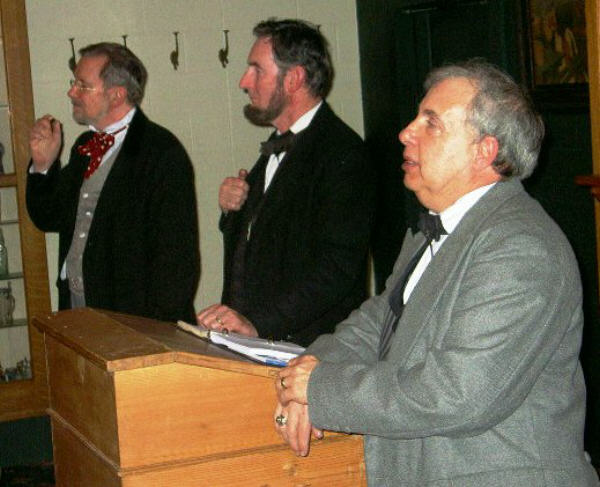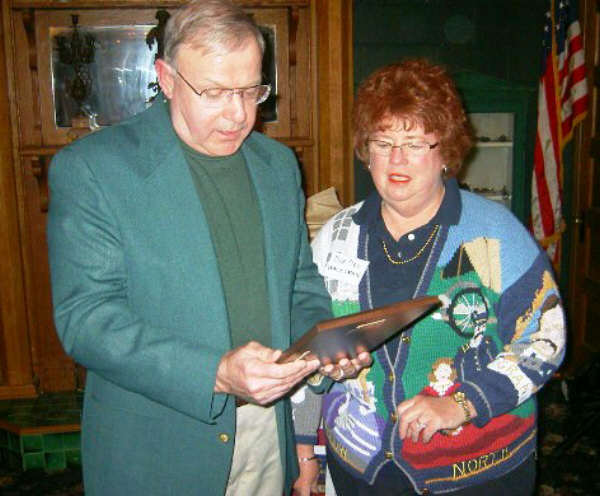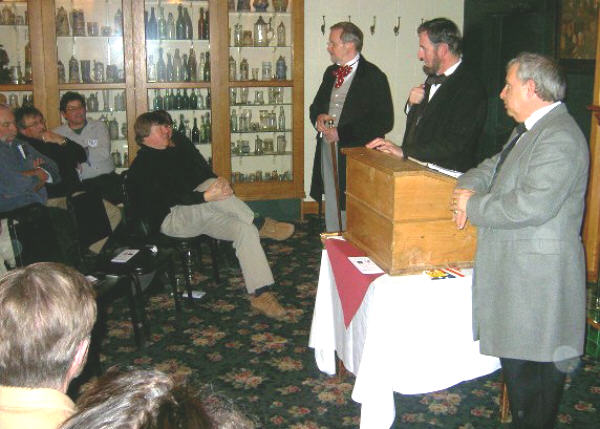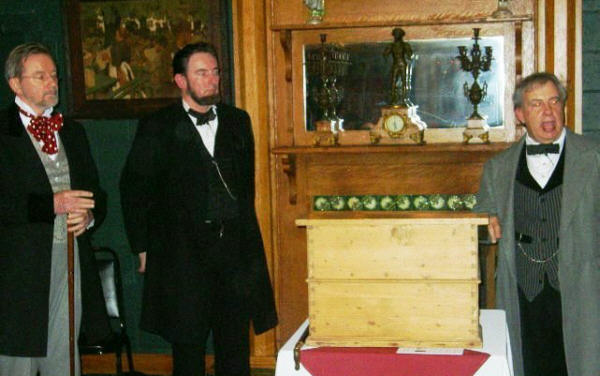Lincoln-Douglas Debate Recreated in Bay City After 150 Years - It's a Draw!
|
||||||||||
| Printer Friendly Story View |

Abraham Lincoln (Fred Priebe), center, and Stephen Douglas (Len Steinberg) trade the same verbal barbs and retorts their characters did 150 years ago in seven historic debates in Illinois.

New CWRT Chair Jerry Pergande presents plaque to Dee Dee Wacksman recognizing her efforts in founding and heading the group for the past five years.
Who won the debate?
About 60 persons attending the Seventh Michigan Cavalry Civil War Round Table's annual dinner meeting at the Stein Haus Wednesday night called it a draw.
The event, marking the group's fifth year, was highlighted by a recreation of one of the most famous series of debates in American history.
Noted Civil War re-enactors Fred Priebe and Len Steinberg, playing Abraham Lincoln and Stephen Douglas, were the main attraction.
Dee Dee Wacksman, local educator and Delta College trustee, was honored for her efforts in founding and leading the group for the past five years She was presented a plaque by Jerry Pergande, new chairman.
Mr. Pergande, an attorney and longtime student of the Civil War, noted that the discovery of a sword belonging to Capt. James G. Birney IV and subsequent local campaign that raised $7,500 to acquire the sword for the Bay County Historical Museum stimulated interest that led to formation of the group.
U.S. Senator Stephen Douglas, Democrat, and Republican challenger Abraham Lincoln debated seven times in small Illinois towns 150 years ago.
Priebe and Steinberg, using scripts from the original debates, were masterful in their depictions, down to the humor each time Lincoln called his opponent "Judge Douglas." It seems that appelation was a sore spot with Douglas, whose career on the bench had been 20 years previously. He wanted to be known only as "Senator Douglas."
The debates were introduced by another 19th century character, Galien, Illinois newspaperman Noah Brooks, who also wrote under the name Cass Dean. He noted that the debates were not about slavery per se, but about the extension of slavery as provided in the Kansas-Nebraska Act, sponsored by Sen. Douglas.

(MyBayCity Photo by Dave Rogers)
Among the more interesting comments by Sen. Douglas were these from the first debate before an estimated 10,000 to 20,000 people at Ottawa, Illinois, 21 August 1858:
"Having formed this new party for the benefit of deserters from Whiggery, and deserters from Democracy, and having laid down the Abolition platform which I have read, Lincoln now takes his stand and proclaims his Abolition doctrines. Let me read a part of them. In his speech at Springfield to the Convention, which nominated him for the Senate, he said:
"In my opinion it will not cease until a crisis shall have been reached and passed. 'A house divided against itself cannot stand.' I believe this government cannot endure permanently half Slave and half Free. I do not expect the Union to be dissolved-I do not expect the house to fall - but I do expect it will cease to be divided. It will become all one thing, or all the other. Either the opponents of slavery will arrest the further spread of it, and place it where the public mind shall rest in the belief that it is in the course of ultimate extinction: or its advocates will push it forward till it shall became alike lawful in all the States-old as well as new, North as well as South."
("Good," "good," and cheers.)
Lincoln's response included the following:
"When Southern people tell us they are no more responsible for the origin of slavery than we, I acknowledge the fact. When it is said that the institution exists, and that it is very difficult to get rid of it, in any satisfactory way, I can understand and appreciate the saying. I surely will not blame them for not doing what I should not know how to do myself. If all earthly power were given me, I should not know what to do, as to the existing institution. My first impulse would be to free all the slaves, and send them to Liberia,-to their own native land. But a moment's reflection would convince me, that whatever of high hope, (as I think there is) there may be in this, in the long run, its sudden execution is impossible. If they were all landed there in a day, they would all perish in the next ten days; and there are not surplus shipping and surplus money enough in the world to carry them there in many times ten days. What then? Free them all, and keep them among us as underlings? Is it quite certain that this betters their condition? I think I would not hold one in slavery at any rate; yet the point is not clear enough to me to denounce people upon. What next? Free them, and make them politically and socially our equals? My own feelings will not admit of this; and if mine would, we well know that those of the great mass of white people will not. Whether this feeling accords with justice and sound judgment, is not the sole question, if, indeed, it is any part of it. A universal feeling, whether well or ill-founded, cannot be safely disregarded. We cannot, then, make them equals. It does seem to me that systems of gradual emancipation might be adopted; but for their tardiness in this, I will not undertake to judge our brethren of the South.
"When they remind us of their constitutional rights, I acknowledge them, not grudgingly, but fully and fairly; and I would give them any legislation for the reclaiming of their fugitives, which should not, in its stringency, be more likely to carry a free man into slavery, than our ordinary criminal laws are to hang an innocent one.
"But all this, to my judgment, furnishes no more excuse for permitting slavery to go into our own free territory, than it would for reviving the African slave-trade by law. The law which forbids the bringing of slaves from Africa, and that which has so long forbid the taking of them to Nebraska, can hardly be distinguished on any moral principle; and the repeal of the former could find quite as plausible excuses as that of the latter."
I have reason to know that Judge Douglas knows that I said this. I think he has the answer here to one of the questions he put to me. I do not mean to allow him to catechise me unless he pays back for it in kind. I will not answer questions one after another, unless he reciprocates; but as he has made this inquiry, and I have answered it before, he has got it without my getting anything in return. He has got my answer on the Fugitive Slave law.
Now, gentlemen, I don't want to read at any greater length, but this is the true complexion of all I have ever said in regard to the institution of slavery and the black race. This is the whole of it, and anything that argues me into his idea of perfect social and political equality with the negro, is but a specious and fantastic arrangement of words, by which a man can prove a horse-chestnut to be a chestnut horse. [Laughter.] I will say here, while upon this subject, that I have no purpose, directly or indirectly, to interfere with the institution of slavery in the States where it exists. I believe I have no lawful right to do so, and I have no inclination to do so. I have no purpose to introduce political and social equality between the white and the black races. There is a physical difference between the two, which, in my judgment, will probably forever forbid their living together upon the footing of perfect equality, and inasmuch as it becomes a necessity that there must be a difference, I, as well as Judge Douglas, am in favor of the race to which I belong having the superior position. I have never said anything to the contrary, but I hold that, notwithstanding all this, there is no reason in the world why the negro is not entitled to all the natural rights enumerated in the Declaration of Independence, the right to life, liberty, and the pursuit of happiness. [Loud cheers.] I hold that he is as much entitled to these as the white man. I agree with Judge Douglas he is not my equal in many respects-certainly not in color, perhaps not in moral or intellectual endowment. But in the right to eat the bread, without the leave of anybody else, which his own hand earns, he is my equal and the equal of Judge Douglas, and the equal of every living man. [Great applause.]

(MyBayCity Photo by Dave Rogers)
| Printer Friendly Story View |
|
|

Dave Rogers |
|
|
|
Printer-Friendly Story View
0200 Nd: 04-20-2024 d 4 cpr 0
12/31/2020 P3v3-0200-Ad.cfm
SPONSORED LINKS
12/31/2020 drop ads P3v3-0200-Ad.cfm


